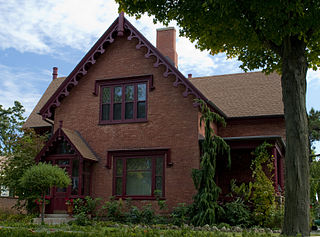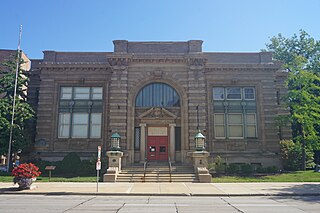
The Racine Legion was a professional American football team based in Racine, Wisconsin, of the National Football League from 1922 to 1924. Its official name was the Horlick-Racine Legion. The team then operated as the Racine Tornadoes in 1926.

Horlicks is a British sweet malted milk hot drink powder developed by founders James and William Horlick. It was first sold as "Horlick's Infant and Invalids Food", soon adding "aged and travellers" to their label. In the early 20th century, it was sold as a powdered meal replacement drink mix.

Malted milk or malt powder or malted milk powder, is a powder made from a mixture of malted barley, wheat flour, and evaporated whole milk powder. The powder is used to add its distinctive flavor to beverages and other foods, but it is also used in baking to help dough cook properly.

William Horlick High School is a comprehensive public four-year high school in Racine, Wisconsin with an enrollment of approximately 2,000 students. The school opened to students in 1928, after William Horlick, the original patent holder for malted milk, donated the land the school was built on. It was designed by Racine architect J. Mandor Matson.

The Pabst Brewery Complex, on a hill northwest of the downtown of Milwaukee, Wisconsin, is the former brewery of the Pabst Brewing Company, where the company innovated to improve their beer and increase production until in 1892 it was the largest brewer of lager in the world. In 2003 the complex was listed on the National Register of Historic Places.

Racine College was an Episcopal preparatory school and college in Racine, Wisconsin, that operated between 1852 and 1933. Located south of the city along Lake Michigan, the campus has been maintained and is today known as the DeKoven Center, a conference center, educational facility, and special events venue operated by the DeKoven Foundation.

This is a list of the National Register of Historic Places listings in Racine County, Wisconsin. It is intended to provide a comprehensive listing of entries in the National Register of Historic Places that are located in Racine County, Wisconsin. The locations of National Register properties for which the latitude and longitude coordinates are included below may be seen in a map.

William Horlick, Sr. was an English food manufacturer and the original patent holder of malted milk. He emigrated to the United States in 1869, settling in Racine, Wisconsin. There he started a food company with his brother, James. Horlick was a well-known philanthropist in the Racine area. He was also a major sponsor of the Racine Legion, which played in the National Football League from 1922 until 1924. He died 25 September 1936 at the age of ninety.

The Old Main Street Historic District in Racine, Wisconsin is an area including a section of Main Street and which is roughly bounded by Second St., Lake Ave., Fifth St., and Wisconsin Ave. It is a 17-acre (6.9 ha) area with elements dating back to 1847. It was listed on the National Register of Historic Places in 1987.

St. Luke's Episcopal Church, Chapel, Guildhall, and Rectory is a historic church complex in Racine, Wisconsin. It was added to the National Register of Historic Places in 1979 for its architectural significance.

Holy Cross Church and Convent is a Roman Catholic church complex in Green Bay, Wisconsin, with six structures built from 1862 to 1932 in various architectural styles. Currently, it is also a church school. The complex was added to the National Register of Historic Places on June 28, 2001 for its architectural significance.

St. Joseph's Catholic Church Complex is located in Waukesha, Wisconsin. The church building itself was built in 1888. On October 28, 1983, the complex was added to the National Register of Historic Places for its architectural significance.

Sir James Horlick, 1st Baronet DL (1844–1921) was, with his brother William (1846–1936), the co-founder of the malted drink Horlicks.

The Chauncey Hall House, also known as Knight House, is located in Racine, Wisconsin, United States. It was added to the National Register of Historic Places in 1976.

The Southside Historic District is a large, prestigious historic neighborhood in Racine, Wisconsin, including over 500 contributing structures in various architectural styles. It was added to the National Register of Historic Places in 1977.

The Racine Heritage Museum is a historical museum building and former Carnegie library, located at 701 S. Main St. in downtown Racine, Wisconsin. Designed by John Mauran in the Beaux-Arts style, the building served as the Racine Public Library from 1904 until 1958, and has housed the Racine Heritage Museum since 1963. It is also the home of the Racine County Historical Society. It was added to the National Register of Historic Places on March 20, 1981.

The Thomas Driver and Sons Manufacturing Company is a complex of two historic factory buildings in downtown Racine, Wisconsin. The Thomas Driver and Sons manufacturing company itself was a manufacturer of sash windows and doors that was first established in 1867. The buildings, located at 134 South Main Street and 214 State Street, are on opposite sides of Second Street. The site was added to the National Register of Historic Places on July 14, 2004.

The Gold Medal building is a historic factory complex in Racine, Wisconsin. The three-story brick-walled mill-type was built between 1894 and 1924. The Wisconsin Historical Society describes the complex as "one of the best remaining examples of a mill-type factory building" in the state.
The Racine Malted Milks were a minor league baseball team based in Racine, Wisconsin.

The Old Fourth Ward Historic District in Janesville, Wisconsin is a large old working-class neighborhood southwest of the downtown, comprising about 1100 contributing structures built from the 1840s to 1930. In 1990 the district was listed on the National Register of Historic Places.




















